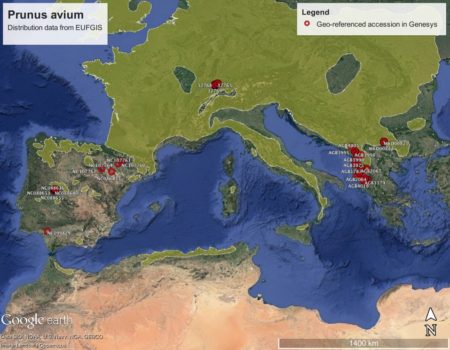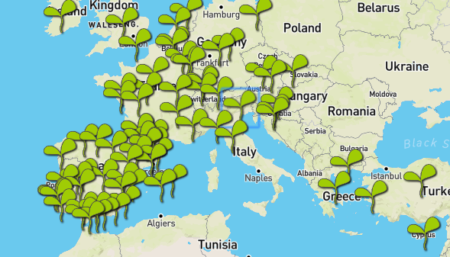- Hari Deo Upadhyaya: Plant Breeder, Geneticist and Genetic Resources Specialist. “A prolific writer and with immense passion for teaching, Hari Upadhyaya has established a school of his own for the management, evaluation and use of genetic resources for crop improvement.”
- The Contribution of Professor Gian Tommasso Scarascia Mugnozza to the Conservation and Sustainable Use of Biodiversity. “It is difficult to fully remember the work of Gian Tommaso Scarascia Mugnozza, a man of charismatic personality, brilliant intelligence, great culture, with an extraordinary capacity of translate his ideas and intuitions into concrete projects”
- Evaluation of sweet sorghum accessions for seedling cold tolerance using both lab and field cold germination test. Try the lab first.
- Does introgression of crop alleles into wild and weedy living populations create cryptic in situ germplasm banks? Yes. Review based on sunflower.
- Variability in Susceptibility to Anthracnose in the World Collection of Olive Cultivars of Cordoba (Spain). About a third of 308 varieties resistant, including the most widely grown, while another widely common one is very susceptible.
- Genomewide association study of ionomic traits on diverse soybean populations from germplasm collections. Didn’t even have to grow them out.
- Bio-fortification potential of global wild annual lentil core collection. This lot were grown out, and Turkey and Syria found to be particularly diverse.
- Genome-wide association analyses identify QTL hotspots for yield and component traits in durum wheat grown under yield potential, drought, and heat stress environments. On chromosomes 2A and 2B.
- Investigating the population structure and genetic differentiation of livestock guard dog breeds. Surprisingly “reasonable” levels of diversity within breeds.
- Genetic monitoring of horses in the Czech Republic: A large-scale study with a focus on the Czech autochthonous breeds. Same for these guys, though breed differentiation was not as good.
- Exploring Agricultural Heritage Landscapes: A Journey Across Terra Incognita. “… a perspective on agricultural landscapes as complex, adaptive biocultural systems has not yet been incorporated into conservation practice.”
European forest conservationists move to Bonn
I’m not sure if it’s been formally announced, but the Secretariat of the European Forest Genetic Resources Programme has moved to Bonn. I know because they’re hosted by the European Forestry Institute just a floor below the offices of the Global Crop Diversity Trust where I work. Among other things, EUFORGEN manages the European Information System on Forest Genetic Resources, which has produced cool distribution maps and other resources, including of some species that are crop wild relatives. Just for a laugh, I’ve downloaded their shapefile for Prunus avium and mashed that up with what little there is in Genesys that’s geo-referenced (click on it to see it better).
That’s interestingly complementary to the map of in situ and ex situ conservation units in EUFGIS.
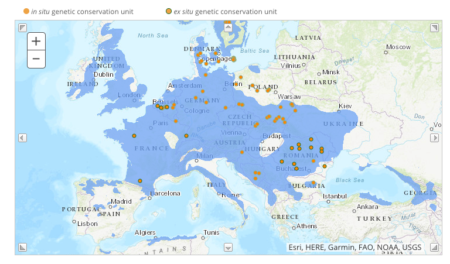
We should really work to have the two systems talk to each other.
Anyway, welcome to Bonn, Michele and Ewa.
European community genebanks organize
Mapping crop names
A tweet by James Wong a couple of days ago, that reproduced a map from a paper from a few years back showing the spread of the words for sweet potato around the world
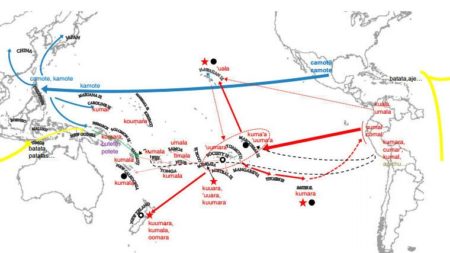
had me searching the dark recesses of my brain, and the interwebs, for similar maps. Recently there was one for tea, for example.
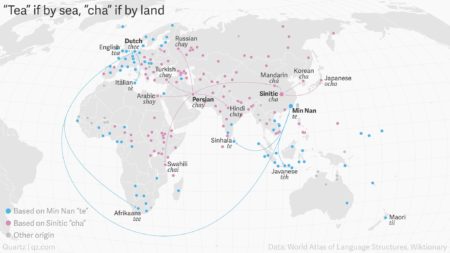
Any others? A Reddit post turned up coffee (as well as honey and sugar).
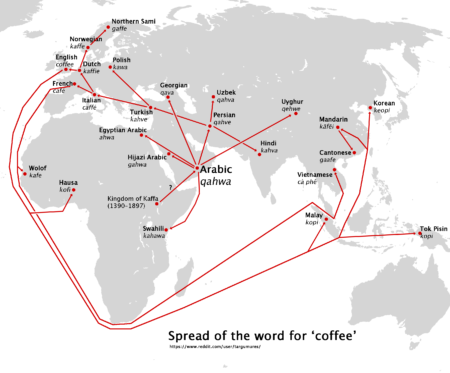
Banana was harder to find.
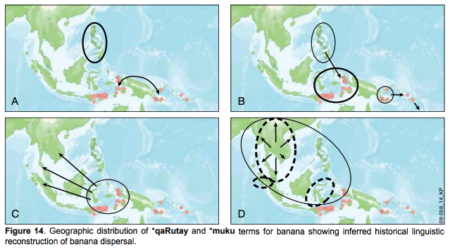
Any more out there?
Spreading the good news about forages
I know I Nibbled it, but I think it’s worth giving a bit more space to the tropical forages newsletter Forages for the Future, edited by Bruce Pengelly and Brigitte Maass. In Brigitte’s words: “The newsletter is meant to start re-building a community that is interested and engaged in tropical and subtropical forage genetic resources, their conservation and utilization.”
All 6 issues may be found on the website of the journal Tropical Grasslands-Forrajes Tropicales. Let us know if you want to be added to the mailing list. Because, as you’ll remember from a recent Brainfood, forages are not all bad.
